1
Not one of your pertinent ancestors was squashed, devoured, drowned, starved, stranded, stuck fast, untimely wounded, or otherwise deflected from its life's quest of delivering a tiny charge of genetic material to the right partner at the right moment in order to perpetuate the only possible sequence of hereditary combinations that could result -- eventually, astoundingly, and all too briefly -- in you.Bill Bryson
2
If this book has a lesson, it is that we are awfully lucky to be here-and by 'we' I mean every living thing. To attain any kind of life in this universe of ours appears to be quite an achievement. As humans we are doubly lucky, of course: We enjoy not only the privilege of existence but also the singular ability to appreciate it and even, in a multitude of ways, to make it better. It is a talent we have only barely begun to grasp. .Bill Bryson
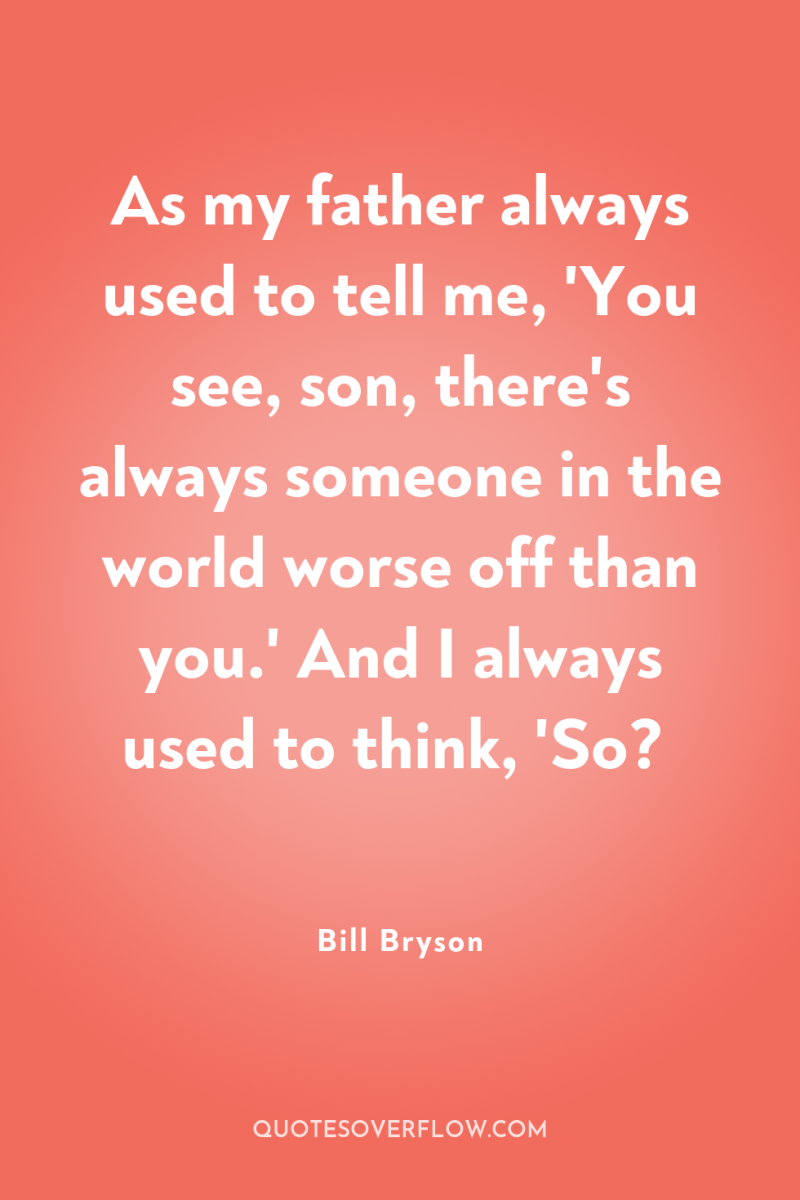
3
As my father always used to tell me, 'You see, son, there's always someone in the world worse off than you.' And I always used to think, 'So?Bill Bryson
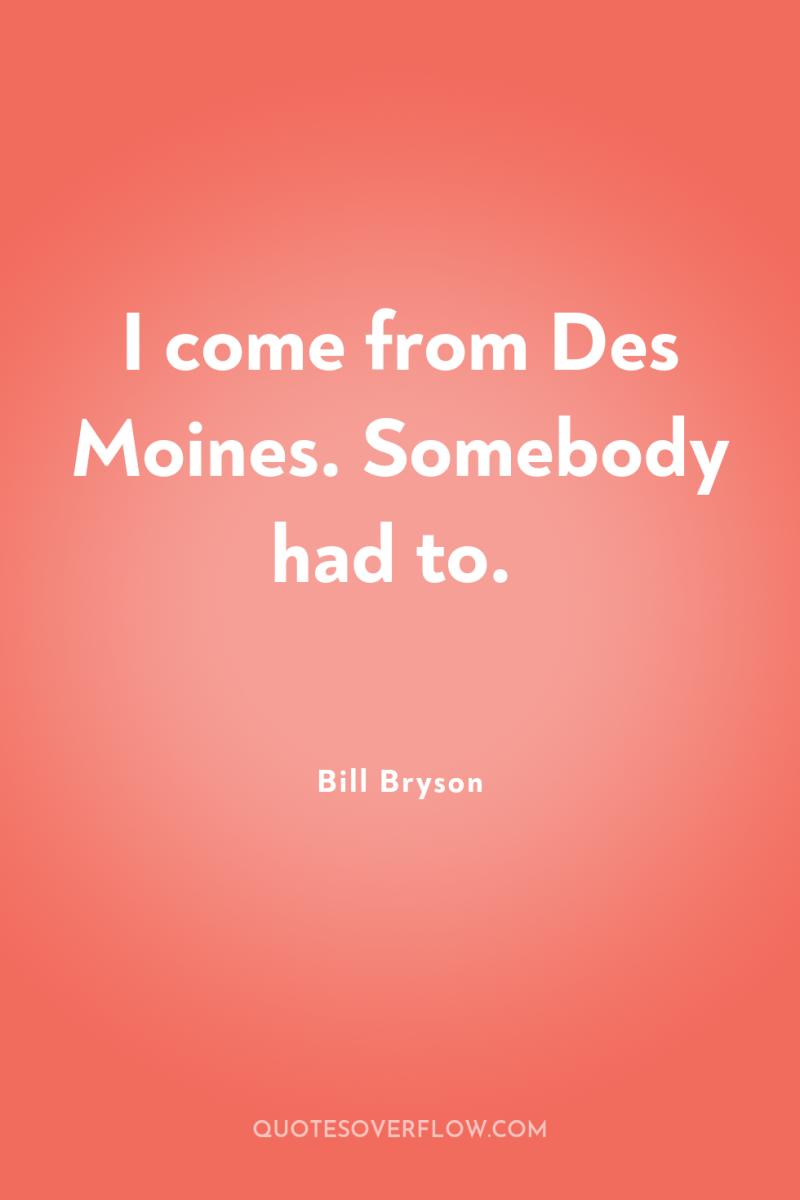
4
I come from Des Moines. Somebody had to.Bill Bryson
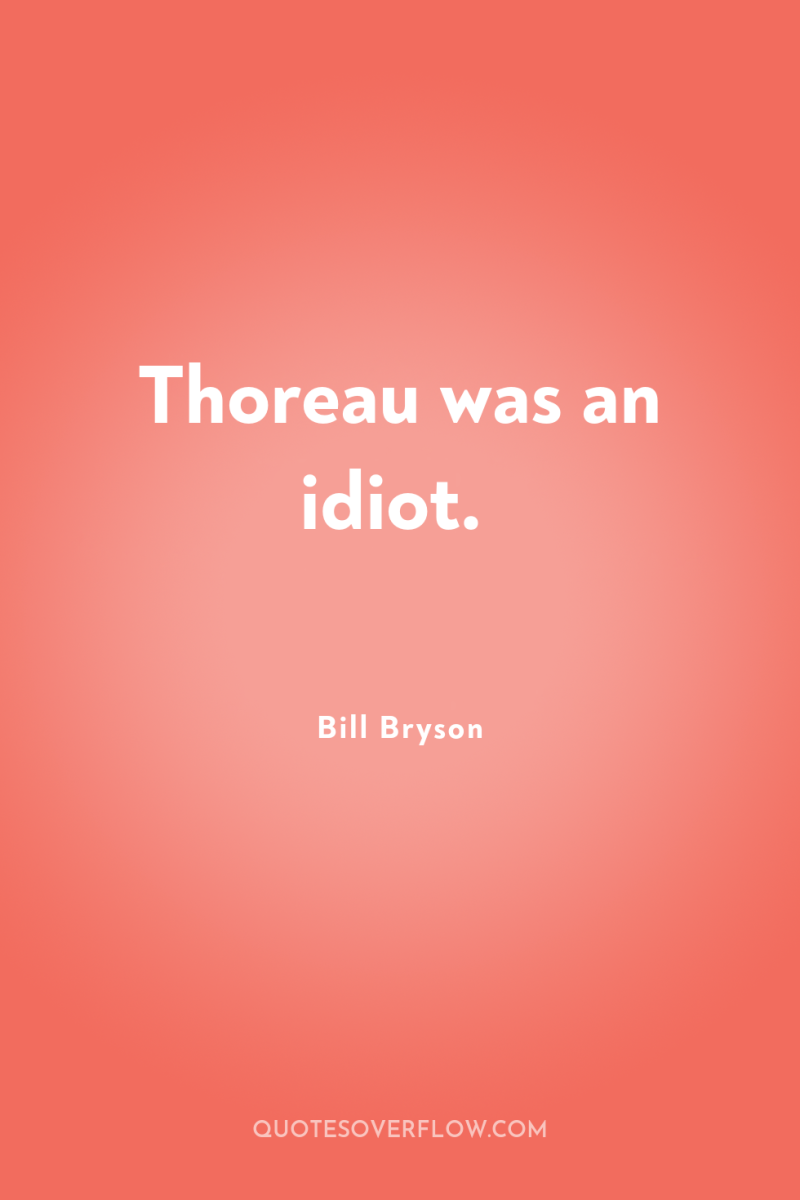
5
Thoreau was an idiot.Bill Bryson
6
I became quietly seized with that nostalgia that overcomes you when you have reached the middle of your life and your father has recently died and it dawns on you that when he went he took some of you with him.Bill Bryson
7
When the poet Paul Valery once asked Albert Einstein if he kept a notebook to record his ideas, Einstein looked at him with mild but genuine surprise. "Oh, that's not necessary, " he replied . "It's so seldom I have one.Bill Bryson
8
We know amazingly little about what happens beneath our feet. It is fairly remarkable to think that Ford has been building cars and baseball has been playing World Series for longer than we have known that the Earth has a core. And of course the idea that the continents move about on the surface like lily pads has been common wisdom for much less than a generation. “Strange as it may seem, ” wrote Richard Feynman, “"we understand the distribution of matter in the interior of the Sun far better than we understand the interior of the Earth. .Bill Bryson

9
She was torn between her customer service training and her youthful certitude.Bill Bryson
10
If you imagine the 4, 500-bilion-odd years of Earth's history compressed into a normal earthly day, then life begins very early, about 4 A.M., with the rise of the first simple, single-celled organisms, but then advances no further for the next sixteen hours. Not until almost 8:30 in the evening, with the day five-sixths over, has Earth anything to show the universe but a restless skin of microbes. Then, finally, the first sea plants appear, followed twenty minutes later by the first jellyfish and the enigmatic Ediacaran fauna first seen by Reginald Sprigg in Australia. At 9:04 P.M. trilobites swim onto the scene, followed more or less immediately by the shapely creatures of the Burgess Shale. Just before 10 P.M. plants begin to pop up on the land. Soon after, with less than two hours left in the day, the first land creatures follow. Thanks to ten minutes or so of balmy weather, by 10:24 the Earth is covered in the great carboniferous forests whose residues give us all our coal, and the first winged insects are evident. Dinosaurs plod onto the scene just before 11 P.M. and hold sway for about three-quarters of an hour. At twenty-one minutes to midnight they vanish and the age of mammals begins. Humans emerge one minute and seventeen seconds before midnight. The whole of our recorded history, on this scale, would be no more than a few seconds, a single human lifetime barely an instant. Throughout this greatly speeded-up day continents slide about and bang together at a clip that seems positively reckless. Mountains rise and melt away, ocean basins come and go, ice sheets advance and withdraw. And throughout the whole, about three times every minute, somewhere on the planet there is a flash-bulb pop of light marking the impact of a Manson-sized meteor or one even larger. It's a wonder that anything at all can survive in such a pummeled and unsettled environment. In fact, not many things do for long. .Bill Bryson
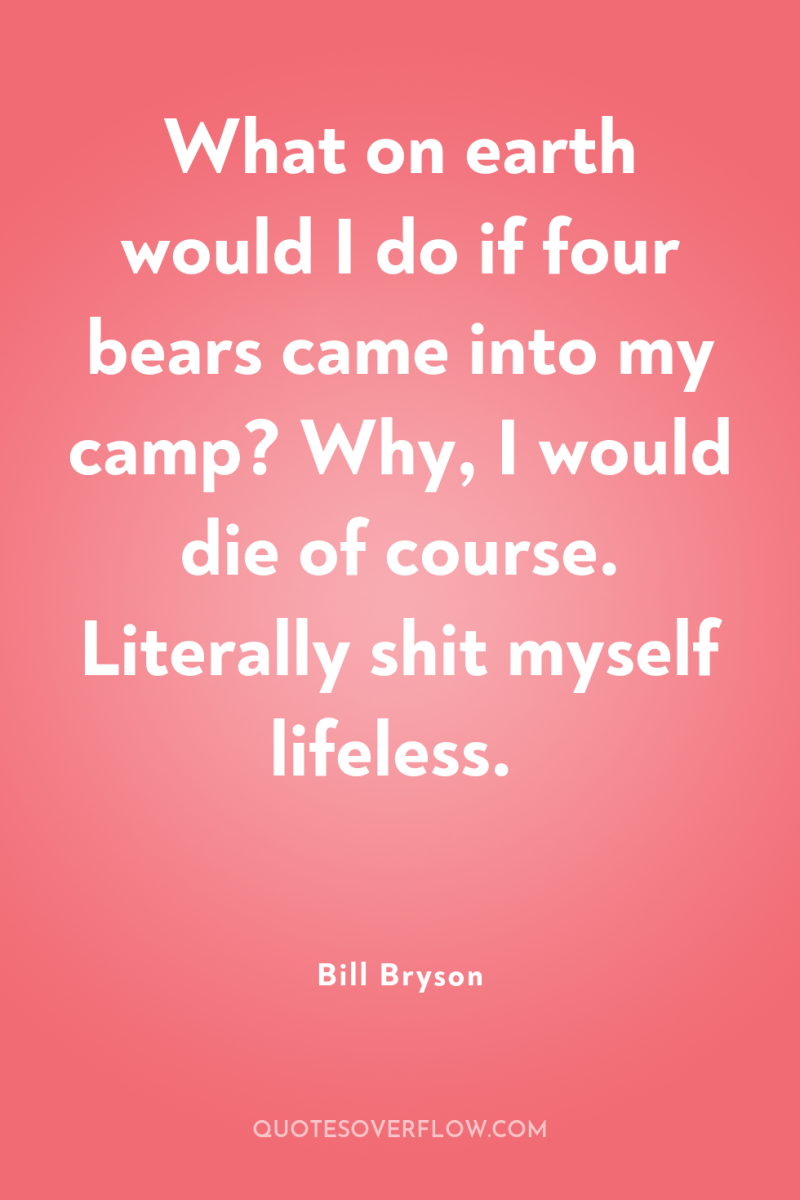
11
What on earth would I do if four bears came into my camp? Why, I would die of course. Literally shit myself lifeless.Bill Bryson
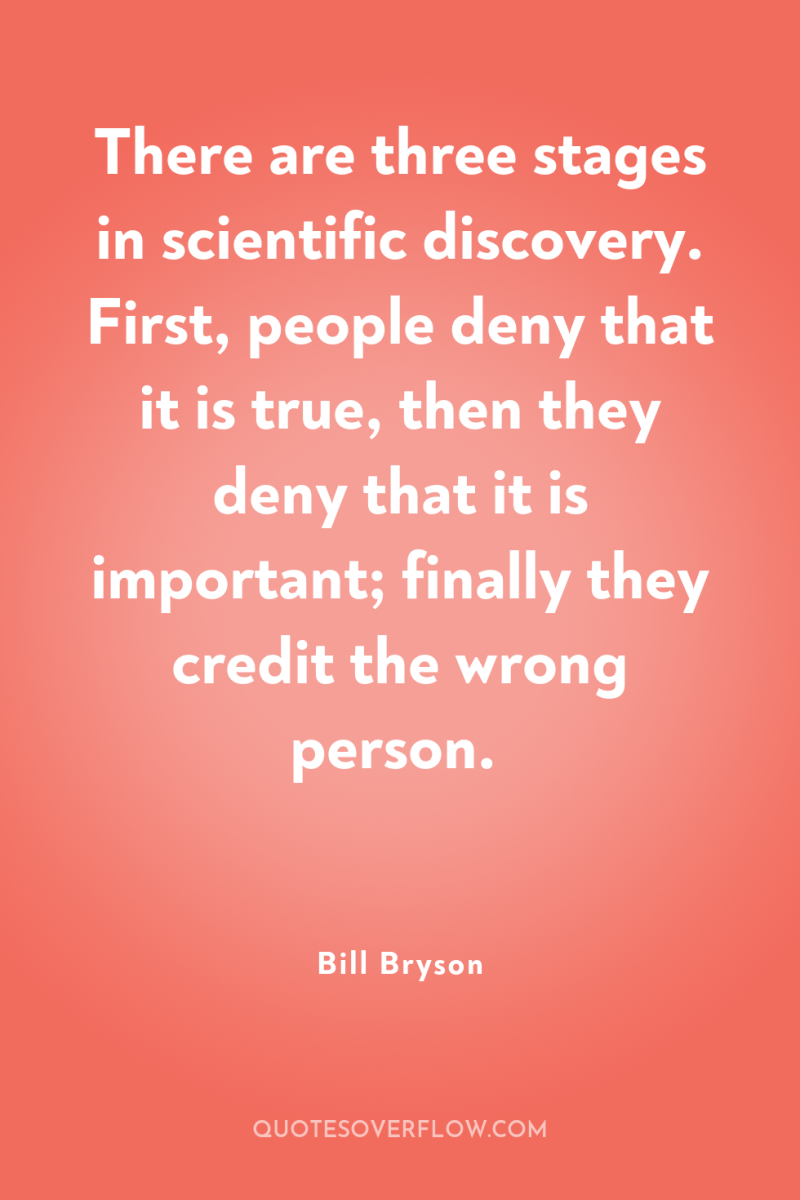
12
There are three stages in scientific discovery. First, people deny that it is true, then they deny that it is important; finally they credit the wrong person.Bill Bryson
13
It is a slightly arresting notion that if you were to pick yourself apart with tweezers, one atom at a time, you would produce a mound of fine atomic dust, none of which had ever been alive but all of which had once been you.Bill Bryson
14
It is easy to overlook this thought that life just is. As humans we are inclined to feel that life must have a point. We have plans and aspirations and desires. We want to take constant advantage of the intoxicating existence we've been endowed with. But what's life to a lichen? Yet its impulse to exist, to be , is every bit as strong as ours-arguably even stronger. If I were told that I had to spend decades being a furry growth on a rock in the woods, I believe I would lose the will to go on. Lichens don't. Like virtually all living things, they will suffer any hardship, endure any insult, for a moment's additions existence. Life, in short just wants to be.Bill Bryson
15
In France, a chemist named Pilatre de Rozier tested the flammability of hydrogen by gulping a mouthful and blowing across an open flame, proving at a stroke that hydrogen is indeed explosively combustible and that eyebrows are not necessarily a permanent feature of one's face.Bill Bryson

16
Energy is liberated matter, matter is energy waiting to happen.Bill Bryson
17
Not only have you been lucky enough to be attached since time immemorial to a favored evolutionary line, but you have also been extremely- make that miraculously- fortunate in your personal ancestry. Consider the fact that for 3.8 billion years, a period of time older than the Earth's mountains and rivers and oceans, everyone of your forbears on both sides has been attractive enough to find a mate, healthy enough to reproduce, and sufficiently blessed by fate and circumstances to live long enough to do so. Not one of your pertinent ancestors was squashed, devoured, drowned, starved, stranded, stuck fast, untimely wounded, or otherwise deflected from it's life quest of delivering a tiny charge of genetic material to the right partner at the right moment in order to perpetuate the only possible sequence of hereditary combinations that could result - evetually, astoundingly, and all to briefly- in you.Bill Bryson

18
Consider the Lichen. Lichens are just about the hardiest visible organisms on Earth, but the least ambitious.Bill Bryson
19
As we parted at the Natural History Museum in London, I asked Richard Fortey how science ensures that when one person goes there's someone ready to take his place. He chuckled rather heartily at my naiveté. 'I'm afraid it's not as if we have substitutes sitting on the bench somewhere waiting to be called in to play. When a specialist retires or, even more unfortunately, dies, that can bring a stop to things in that field, sometimes for a very long while.' And I suppose that's why you value someone who spends forty-two years studying a single species of plant, even if it doesn't produce anything terribly new?'' Precisely, ' he said, 'precisely.' And he really seemed to mean it. .Bill Bryson
20
Every atom you possess has almost certainly passed through several stars and been part of millions of organisms on its way to becoming you. We are each so atomically numberous and so vigorously recycled at death that a significant number of our atoms-up to a billion for each of us, it has been suggested-probably once belonged to Shakespeare. A billion more each came from Buddha and Genghis Khan and Beethoven, and any other historical figure you care to name.Bill Bryson
21
This is a world where things move at their own pace, including a tiny lift Fortey and I shared with a scholarly looking elderly man with whom Fortey chatted genially and familiarly as we proceeded upwards at about the rate that sediments are laid down. When the man departed, Fortey said to me: "That was a very nice chap named Norman who's spent forty-two years studying one species of plant, St. John's wort. He retired in 1989, but he still comes in every week."" How do you spend forty-two years on one species of plant?" I asked." It's remarkable, isn't it?" Fortey agreed. He thought for a moment. "He's very thorough apparently." The lift door opened to reveal a bricked over opening. Fortey looked confounded. "That's very strange, " he said. "That used to be Botany back there." He punched a button for another floor, and we found our way at length to Botany by means of back staircases and discreet trespass through yet more departments where investigators toiled lovingly over once-living objects.Bill Bryson
22
Bipedalism is a demanding and risky strategy. It means refashioning the pelvis into a full load-bearing instrument. To preserve the required strength, the birth canal in the female must be comparatively narrow. This has two very significant immediate consequences and one longer-term one. First, it means a lot of pain for any birthing mother and greatly increased danger of fatality to mother and baby both. Moreover, to get the baby's head through such a tight space it must be born while it's brain is still small - and while the baby, therefore, is still helpless. This means long-term infant care, which in turn implies solid male-female bonding. .Bill Bryson
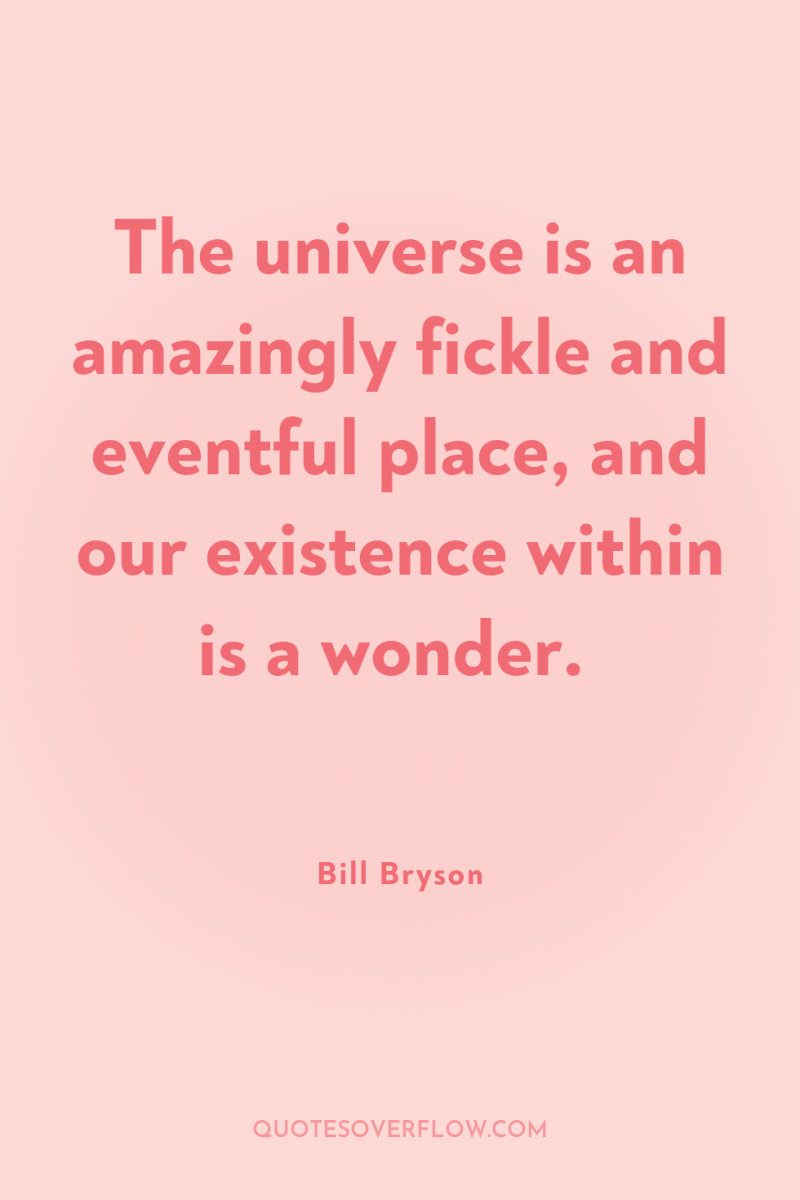
23
The universe is an amazingly fickle and eventful place, and our existence within is a wonder.Bill Bryson
24
I know this goes without saying, but Stonehenge really was the most incredible accomplishment. It took five hundred men just to pull each sarsen, plus a hundred more to dash around positioning the rollers. Just think about it for a minute. Can you imagine trying to talk six hundred people into helping you drag a fifty-ton stone eighteen miles across the countryside and muscle it into an upright position, and then saying, 'Right, lads! Another twenty like that, plus some lintels and maybe a couple of dozen nice bluestones from Wales, and we can party! ' Whoever was the person behind Stonehenge was one dickens of a motivator, I'll tell you that. .Bill Bryson
25
[About Uluru] I'm suggesting nothing here, but I will say that if you were an intergalactic traveler who had broken down in our solar system, the obvious directions to rescuers would be: "Go to the third planet and fly around till you see the big red rock. You can't miss it." If ever on earth they dig up a 150, 000-year-old rocket ship from the galaxy Zog, this is where it will be. I'm not saying I expect it to happen; not saying that at all. I'm just observing that if I were looking for an ancient starship this is where I would start digging. .Bill Bryson
26
…a waitress came out and plonked in front of each of us a small standard terra-cotta flowerpot in which had been baked a little loaf of bread." What's this?" I asked." It's bread, " she replied." But it's in a flowerpot?" She gave me a look that I was beginning to think of as the Darwin stare. It was a look that said, "Yeah? So?""Well, isn't that kind of unusual?" She considered for a moment. "Is a bit, I suppose." "And will we be following a horticultural theme throughout the meal?" Her expression contorted in a deeply pained look, as if she were trying to suck her face into the back of her head. "What?""Will the main course arrive in a wheelbarrow?" I elaborated helpfully. "Will you be serving the salad with a pitchfork?"" Oh, no. It's just the bread that's special."" I'm so pleased to hear it.Bill Bryson

27
The pleasant fact is that the British are not much good at violent crime except in fiction, which is of course as it should be.Bill Bryson
28
In America, alas, beauty has become something you drive to, and nature an either/or proposition--either you ruthlessly subjugate it, as at Tocks Dam and a million other places, or you deify it, treat it as something holy and remote, a thing apart, as along the Appalachian Trail. Seldom would it occur to anyone on either side that people and nature could coexist to their mutual benefit--that, say, a more graceful bridge across the Delaware River might actually set off the grandeur around it, or that the AT might be more interesting and rewarding if it wasn't all wilderness, if from time to time it purposely took you past grazing cows and till fields.Bill Bryson
29
He left to do whatever editors do.Bill Bryson
30
Nothing - really, absolutely nothing - says more about Victorian Britain and its capacity for brilliance than that the century's most daring and iconic building was entrusted to a gardener.Bill Bryson
31
Shakespeare 'never owned a book, ' a writer for the New York Times gravely informed readers in one doubting article in 2002. The statement cannot actually be refuted, for we know nothing about his incidental possessions. But the writer might just as well have suggested that Shakespeare never owned a pair of shoes or pants. For all the evidence tells us, he spent his life naked from the waist down, as well as bookless, but it is probably that what is lacking is the evidence, not the apparel or the books. .Bill Bryson
32
It was an odd situation. For a century and a half, men got rid of their own hair, which was perfectly comfortable, and instead covered their heads with something foreign and uncomfortable. Very often it was actually their own hair made into a wig. People who couldn't afford wigs tried to make their hair look like a wig.Bill Bryson
33
For anyone of a rational disposition, fashion is often nearly impossible to fathom. Throughout many periods of history — perhaps most — it can seem as if the whole impulse of fashion has been to look maximally ridiculous. If one could be maximally uncomfortable as well, the triumph was all the greater.Bill Bryson
34
Just a month after the completion of the Declaration of Independence, at a time when he delegates might have been expected to occupy themselves with more pressing concerns -like how they were going to win the war and escape hanging- Congress quite extraordinarily found time to debate business for a motto for the new nation. (Their choice, E Pluribus Unum, "One from Many", was taken from, of all places, a recipe for salad in an early poem by Virgil.) .Bill Bryson
35
Considerable thought was given in early Congresses to the possibility of renaming the country. From the start, many people recognized that United States of America was unsatisfactory. For one thing, it allowed of no convenient adjectival form. A citizen would have to be either a United Statesian or some other such clumsy locution, or an American, thereby arrogating to ourselves a title that belonged equally to the inhabitants of some three dozen other nations on two continents. Several alternatives to America were actively considered -Columbia, Appalachia, Alleghania, Freedonia or Fredonia (whose denizens would be called Freeds or Fredes)- but none mustered sufficient support to displace the existing name.Bill Bryson
36
From that original colony sprang seven names that still feature on the landscape: Roanoke (which has the distinction of being the first Indian word borrowed by English settlers), Cape Fear, Cape Hatteras, the Chowan and Neuse Rivers, Chesapeake, and Virginia. (Previously, Virginia had been called Windgancon, meaning "what gay clothes you wear" - apparently what the locals had replied when an early reconnoitering party had asked the place's name.) .Bill Bryson
37
Whatever happens in the world - whatever is discovered or created or bitterly fought over - eventually ends up, in one way or another, in your house. Wars, famine, the Industrial Revolution, the Enlightenment - they are all there in your sofas and chests of drawers, tucked into the folds of your curtains, in the downy softness of your pillows, in the paint on your walls and the water in your pipes. So the history of household life isn't just a history of beds and sofas and kitchen stoves. . but of scurvy and guano and the Eiffel Tower and bedbugs and body-snatching and just about everything else that has ever happened. Houses aren't refuges from history. They are where history ends up.Bill Bryson
38
It's an unnerving thought that we may be the living universe's supreme achievement and its worst nightmare simultaneously.Bill Bryson
39
Disassemble the cells of a sponge (by passing them through a sieve, for instance), then dump them into a solution, and they will find their way back together and build themselves into a sponge again. You can do this to them over and over, and they will doggedly reassemble because, like you and me and every other living thing, they have one overwhelming impulse: to continue to be.Bill Bryson
40
Hunters will tell you that a moose is a wily and ferocious forest creature. Nonsense. A moose is a cow drawn by a three-year-old.Bill Bryson
41
Three hundred types of mussel, a third of the world’s total, live in the Smokies. Smokies mussels have terrific names, like purple wartyback, shiny pigtoe, and monkeyface pearlymussel. Unfortunately, that is where all interest in them ends. Because they are so little regarded, even by naturalists, mussels have vanished at an exceptional rate. Nearly half of all Smokies mussels species are endangered; twelve are thought to be extinct. This ought to be a little surprising in a national park. I mean it’s not as if mussels are flinging themselves under the wheels of passing cars. Still, the Smokies seem to be in the process of losing most of their mussels. The National Park Service actually has something of a tradition of making things extinct. Bryce Canyon National Park is perhaps the most interesting-certainly the most striking-example. It was founded in 1923 and in less than half a century under the Park Service’s stewardship lost seven species of mammal-the white-tailed jackrabbit, prairie dog, pronghorn antelope, flying squirrel, beaver, red fox, and spotted skunk. Quite an achievement when you consider that these animals had survived in Bryce Canyon for tens of millions of years before the Park Service took an interest in them. Altogether, forty-two species of mammal have disappeared from America's national parks this century. .Bill Bryson
42
I know a man who drives 600 yards to work. I know a woman who gets in her car to go a quarter of a mile to a college gymnasium to walk on a treadmill, then complains passionately about the difficulty of finding a parking space. When I asked her once why she didn't walk to the gym and do five minutes less on the treadmill, she looked at me as if I were being willfully provocative. 'Because I have a program for the treadmill, ' she explained. 'It records my distance and speed, and I can adjust it for degree of difficulty.' It hadn't occurred to me how thoughtlessly deficient nature is in this regard.Bill Bryson
43
America's industrial success produced a roll call of financial magnificence: Rockefellers, Morgans, Astors, Mellons, Fricks, Carnegies, Goulds, du Ponts, Belmonts, Harrimans, Huntingtons, Vanderbilts, and many more based in dynastic wealth of essentially inexhaustible proportions. John D. Rockefeller made $1 billion a year, measured in today's money, and paid no income tax. No one did, for income tax did not yet exist in America. Congress tried to introduce an income tax of 2 percent on earnings of $4, 000 in 1894, but the Supreme Court ruled it unconstitutional. Income tax wouldn't become a regular part of American Life until 1914. People would never be this rich again. Spending all this wealth became for many a more or less full-time occupation. A kind of desperate, vulgar edge became attached to almost everything they did. At one New York dinner party, guests found the table heaped with sand and at each place a little gold spade; upon a signal, they were invited to dig in and search for diamonds and other costly glitter buried within. At another party - possibly the most preposterous ever staged - several dozen horses with padded hooves were led into the ballroom of Sherry's, a vast and esteemed eating establishment, and tethered around the tables so that the guests, dressed as cowboys and cowgirls, could enjoy the novel and sublimely pointless pleasure of dining in a New York ballroom on horseback.Bill Bryson
44
The hard and unexpected part is the realization not just that my son is not here but that the boy he was is gone forever. I would give anything to have them both back. But of course that cannot be. Life moves on. Kids grow up and move away, and if you don't know this already, believe me, it happens faster than you can imagine.Bill Bryson
45
Mr. Schlubb, the pear-shaped PE teacher, sent us all out to run half a dozen laps around a preposterously enormous cinder track. For the Greenwood kids–all of us white, marshmallowy, innately unphysical, squinting unfamiliarly in the bright sunshine–it was a shock to the system of an unprecedented order.Bill Bryson
46
Take a moment from time to time to remember that you are alive. I know this sounds a trifle obvious, but it is amazing how little time we take to remark upon this singular and gratifying fact. By most astounding stroke of luck and infinitesimal portion of all the matter in the universe came together to create you and for the tiniest moment in the great span of eternity you have the incomparable privilege to exist. For endless eons there was no you. Before you know it, you will cease to be again. And in between you have this wonderful opportunity to see and feel and think and do. Whatever else you do with your life, nothing will remotely compare with the incredible accomplishment of having managed to get yourself born. Congratulations. Well done. You really are special. .Bill Bryson
47
And there was never a better time to delve for pleasure in language than the sixteenth century, when novelty blew through English like a spring breeze. Some twelve thousand words, a phenomenal number, entered the language between 1500 and 1650, about half of them still in use today, and old words were employed in ways not tried before. Nouns became verbs and adverbs; adverbs became adjectives. Expressions that could not have grammatically existed before - such as 'breathing one's last' and 'backing a horse', both coined by Shakespeare - were suddenly popping up everywhere. .Bill Bryson
48
In my day the principal concerns of university students were sex, smoking dope, rioting and learning. Learning was something you did only when the first three weren't available.Bill Bryson
49
I used to give X-ray vision a lot of thought because I couldn’t see how it could work. I mean, if you could see through people’s clothing, then surely you would also see through their skin and right into their bodies. You would see blood vessels, pulsing organs, food being digested and pushed through coils of bowel, and much else of a gross and undesirable nature. Even if you could somehow confine your X-rays to rosy epidermis, any body you gazed at wouldn’t be in an appealing natural state, but would be compressed and distorted by unseen foundation garments. The breasts, for one thing, would be oddly constrained and hefted, basketed within an unseen bra, rather than relaxed and nicely jiggly. It wouldn’t be satisfactory at all–or at least not nearly satisfactory enough. Which is why it was necessary to perfect ThunderVisionâ„¢, a laserlike gaze that allowed me to strip away undergarments without damaging skin or outer clothing. That ThunderVision, stepped up a grade and focused more intensely, could also be used as a powerful weapon to vaporize irritating people was a pleasing but entirely incidental benefit.Bill Bryson
50
The author reveals a cultural change that took place when clergy were paid based on a tax on the land's value rather than what it produced. This meant that, while parishioners could suffer through a terrible year, clergy would always have a comfortable one.Bill Bryson
51
But that's the glory of foreign travel, as far as I am concerned. I don't want to know what people are talking about. I can't think of anything that excites a greater sense of childlike wonder than to be in a country where you are ignorant of almost everything. Suddenly you are five years old again. You can't read anything, you have only the most rudimentary sense of how things work, you can't even reliably cross a street without endangering your life. Your whole existence becomes a series of interesting guesses.Bill Bryson
52
I turned to my own bunk and examined it with a kind of appalled fascination. If the mattress stains were anything to go by, a previous user had not so much suffered from incontinence as rejoiced in it. He had evidently included the pillow in his celebrations.Bill Bryson
53
It was the kind of pure, undiffused light that can only come from a really hot blue sky, the kind that makes even a concrete highway painful to behold and turns every distant reflective surface into a little glint of flame. Do you know how sometimes on very fine days the sun will shine with a particular intensity that makes the most mundane objects in the landscape glow with an unusual radiance, so that buildings and structures you normally pass without a glance suddenly become arresting, even beautiful? Well, they seem to have that light in Australia nearly all the time.Bill Bryson
54
Distance changes utterly when you take the world on foot. A mile becomes a long way, two miles literally considerable, ten miles whopping, fifty miles at the very limits of conception. The world, you realize, is enormous in a way that only you and a small community of fellow hikers know. Planetary scale is your little secret. Life takes on a neat simplicity, too. Time ceases to have any meaning. When it is dark, you go to bed, and when it is light again you get up, and everything in between is just in between. It’s quite wonderful, really. You have no engagements, commitments, obligations, or duties; no special ambitions and only the smallest, least complicated of wants; you exist in a tranquil tedium, serenely beyond the reach of exasperation, “far removed from the seats of strife, ” as the early explorer and botanist William Bartram put it. All that is required of you is a willingness to trudge. There is no point in hurrying because you are not actually going anywhere. However far or long you plod, you are always in the same place: in the woods. It’s where you were yesterday, where you will be tomorrow. The woods is one boundless singularity. Every bend in the path presents a prospect indistinguishable from every other, every glimpse into the trees the same tangled mass. For all you know, your route could describe a very large, pointless circle. In a way, it would hardly matter. At times, you become almost certain that you slabbed this hillside three days ago, crossed this stream yesterday, clambered over this fallen tree at least twice today already. But most of the time you don’t think. No point. Instead, you exist in a kind of mobile Zen mode, your brain like a balloon tethered with string, accompanying but not actually part of the body below. Walking for hours and miles becomes as automatic, as unremarkable, as breathing. At the end of the day you don’t think, “Hey, I did sixteen miles today, ” any more than you think, “Hey, I took eight-thousand breaths today.” It’s just what you do.Bill Bryson
55
I ordered a coffee and a little something to eat and savored the warmth and dryness. Somewhere in the background Nat King Cole sang a perky tune. I watched the rain beat down on the road outside and told myself that one day this would be twenty years ago.Bill Bryson
56
What is it about maps? I could look at them all day, earnestly studying the names of towns and villages I have never heard of and will never visit...Bill Bryson
57
By the time I had finished my coffee and returned to the streets, the rain had temporarily abated, but the streets were full of vast puddles where the drains where unable to cope with the volume of water. Correct me if I'm wrong, but you would think that if one nation ought by now to have mastered the science of drainage, Britain would be it.Bill Bryson
58
To my mind, the greatest reward and luxury of travel is to be able to experience everyday things as if for the first time, to be in a position in which almost nothing is so familiar it is taken for granted.Bill Bryson
59
I suppose because I grew up a thousand miles from the sea and missed the great age of passenger liners, I have always been subject to a romantic longing for ocean travel.Bill Bryson
60
The thing about Ayers Rock is that by the time you finally get there you are already a little sick of it.Bill Bryson
61
The romance of travel wasn't always terribly evident to those who were actually experiencing it.Bill Bryson
62
Bulgaria, I reflected as I walked back to the hotel, isn’t a country; it’s a near-death experience.Bill Bryson
63
[Traveling] makes you realize what an immeasurably nice place much of America could be if only people possessed the same instinct for preservation as they do in Europe. You would think the millions of people who come to Williamsburg every year would say to each other, "Gosh, Bobbi, this place is beautiful. Let's go home to Smellville and plant lots of trees and preserve all the fine old buildings." But in fact that never occurs to them. They just go back and build more parking lots and Pizza Huts. .Bill Bryson
64
Perhaps it’s my natural pessimism, but it seems that an awfully large part of travel these days is to see things while you still can.Bill Bryson
65
They were Republicans, Nixon Republicans, and so didn't subscribe to the notion that laws are supposed to apply to all people equally.Bill Bryson
66
If the mattress stains were anything to go by, a previous user had not so much suffered from incontinence as rejoiced in it.Bill Bryson
67
On a cooler sun on a primordial earth: "I later learned that biologists, when they are feeling jocose, refer to this as the 'Chinese Resaturant Problem'--because we has a dim sun.Bill Bryson
68
These Cro-Magnon people were identical to us: they had the same physique, the same brain, the same looks. And, unlike all previous hominids who roamed the earth, they could choke on food. That may seem a trifling point, but the slight evolutionary change that pushed man's larynx deeper into his throat, and thus made choking a possibility, also brought with it the possibility of sophisticated, well articulated speech. Other mammals have no contact between their air passages and oesophagi. They can breathe and swallow at the same time, and there is no possibility of food going down the wrong way. But with Homo sapiens food and drink must pass over the larynx on the way to the gullet and thus there is a constant risk that some will be inadvertently inhaled. In modern humans, the lowered larynx isn't in position from birth. It descends sometime between the ages of three and five months - curiously, the precise period when babies are likely to suffer from Sudden Infant Death Syndrome. At all events, the descended larynx explains why you can speak and your dog cannot.Bill Bryson
69
By the 1920s if you wanted to work behind a lunch counter you needed to know that 'Noah's boy' was a slice of ham (since Ham was one of Noah’s sons) and that 'burn one' or 'grease spot' designated a hamburger. 'He'll take a chance' or 'clean the kitchen' meant an order of hash, 'Adam and Eve on a raft' was two poached eggs on toast, 'cats' eyes' was tapioca pudding, 'bird seed' was cereal, 'whistleberries' were baked beans, and 'dough well done with cow to cover' was the somewhat labored way of calling for an order of toast and butter. Food that had been waiting too long was said to be 'growing a beard'. Many of these shorthand terms have since entered the mainstream, notably BLT for a bacon, lettuce, and tomato sandwich, 'over easy' and 'sunny side up' in respect of eggs, and 'hold' as in 'hold the mayo'. .Bill Bryson
70
Because of social strictures against even the mildest swearing, America developed a particularly rich crop of euphemistic expletives - darn, durn, goldurn, goshdad, goshdang, goshawful, blast, consarn, confound, by Jove, by jingo, great guns, by the great horn spoon (a nonce term first cited in the Biglow Papers), jo-fired, jumping Jehoshaphat, and others almost without number - but even this cautious epithets could land people in trouble as late as the 1940s.Bill Bryson
71
Just because a word or expression has an antiquity or was once widely used does not confer on it some special immunityBill Bryson
72
If we should be worrying about anything to do with the future of English, it should not be that the various strands will drift apart but that they will grow indistinguishable. And what a sad, sad loss that would be.Bill Bryson
73
It was so bad, it was worth more than we paid.Bill Bryson
74
One consequential change is that people used to get most of their calories at breakfast and midday, with only the evening top-up at suppertime. Now those intakes are almost exactly reversed. Most of us consume the bulk--a sadly appropriate word here--of our calories in the evening and take them to bed with us, a practice that doesn't do any good at all.Bill Bryson
75
Tune your television to any channel it doesn't receive and about 1 percent of the dancing static you see is accounted for by this ancient remnant of the Big Bang. The next time you complain that there is nothing on, remember that you can always watch the birth of the universe.Bill Bryson
76
It seems impossible that you could get something from nothing, but the fact that once there was nothing and now there is a universe is evident proof that you can.Bill Bryson
77
Widespread commercial distribution of ice was so new that 300 tons of the precious commodity melted at one port while customs officials tried to figure out how to classify it.Bill Bryson
78
It is not as if farming brought a great improvement in living standards either. A typical hunter-gatherer enjoyed a more varied diet and consumed more protein and calories than settled people, and took in five times as much viatmin C as the average person today.Bill Bryson
79
If a potato can produce vitamin C, why can't we? Within the animal kingdom only humans and guinea pigs are unable to synthesize vitamin C in their own bodies. Why us and guinea pigs? No point asking. Nobody knows.Bill Bryson
80
Describing his experience with the sting of an extremely toxic jellyfish, he did something you don't often see a scientist do: he shivered.Bill Bryson
81
When you consider it from a human perspective, and clearly it would be difficult for us to do otherwise, life is an odd thing. It couldn't wait to get going, but then, having gotten going, it seemed in very little hurry to move on.Bill Bryson
82
The little town of Dayton - not far from where Katz and I now sat, as it happened - was the scene of the famous Scopes trial in 1925, when the state prosecuted a schoolteacher named John Thomas Scopes for rashly promulgating Darwinian hogwash. As nearly everyone knows, Clarence Darrow, for the defense, roundly humiliated William Jennings Bryan, for the prosecution, but what most people don't realize is that Darrow lost the case. Scopes was convicted, and the law wasn't overturned in Tennessee until 1967. And now the state was about to bring the law back, proving conclusively that the danger for Tennesseans isn't so much that they may be descended from apes as overtaken by them. .Bill Bryson
83
A computer is a stupid machine with the ability to do incredibly smart things, while computer programmers are smart people with the ability to do incredibly stupid things.Bill Bryson
84
It was a lot more fun to get famous than to be famous.Bill Bryson
85
It is always quietly thrilling to find yourself looking at a world you know well but have never seen from such an angle before.Bill Bryson
86
I sat on a toilet watching the water run thinking what an odd thing tourism is. You fly off to a strange land, eagerly abandoning all the comforts of home and then expend vast quantities of time and money in a largely futile effort to recapture the comforts you wouldn’t have lost if you hadn’t left home in the first place.Bill Bryson
87
Linguist say parties in the conversation will tolerate silence for four seconds before interjecting anything, however unrelated.Bill Bryson
88
They talk about big skies in the western United States, and they may indeed have them, but you have never seen such lofty clouds, such towering anvils, as in Iowa in July.Bill Bryson
89
Imagine having a city full of things that no other city had.Bill Bryson
90
Finally, this being America, there is the constant possibility of murder.Bill Bryson
91
The Moon is slipping from our grasp at a rate of about 1.5 inches a year. In another two billion years it will have receded so far that it won’t keep us steady and we will have to come up with some other solution, but in the meantime you should think of it as much more than just a pleasant feature in the night sky.Bill Bryson
92
Imagine trying to live in a world dominated by dihydrogen oxide, a compound that has no taste or smell and is so variable in its properties that it is generally benign but at other times swiftly lethal. Depending on its state, it can scald you or freeze you. In the presence of certain organic molecules it can form carbonic acids so nasty that they can strip the leaves from trees and eat the faces off statuary. In bulk, when agitated, it can strike with a fury that no human edifice could withstand. Even for those who have learned to live with it, it is an often murderous substance. We call it water.Bill Bryson
93
Worse still, it isn’t actually necessary to look to space for petrifying danger. As we are about to see, Earth can provide plenty of danger of its own.Bill Bryson
94
You are totally at the mercy of nature in this country, mate. It's just a fact of life.Bill Bryson
95
It wasn't until we dropped him at his university dormitory and left him there looking touchingly lost and bewildered amid an assortment of cardboard boxes and suitcases in a spartan room not unlike a prison cell that it really hit home that he was vanishing out of our lives and into his own.Bill Bryson
96
This was 1990 the year that communism died in Europe and it seemed strange to me that in all the words that were written about the fall of the iron curtain, nobody anywhere lamented that it was the end of a noble experiment. I know that communism never worked and I would have disliked living under it myself but none the less it seems that there was a kind of sadness in the thought that the only economic system that appeared to work was one based on self interest and greed.Bill Bryson
97
The question that naturally occurs is “What would it be like if a star exploded nearby?” Our nearest stellar neighbor, as we have seen, is Alpha Centauri, 4.3 light-years away. I had imagined that if there were an explosion there we would have 4.3 years to watch the light of this magnificent event spreading across the sky, as if tipped from a giant can. What would it be like if we had four years and four months to watch an inescapable doom advancing toward us, knowing that when it finally arrived it would blow the skin right off our bones? Would people still go to work? Would farmers plant crops? Would anyone deliver them to the stores? .Bill Bryson
98
In terms of adaptability, humans are pretty amazingly useless.Bill Bryson
99
[Americans] were, for one thing, so smitten with the idea of progress that they invented things without having any idea whether those things would be of any use.Bill Bryson
100
Tunney has all the makings of a hero — he was clean living, intelligent, polite, reasonably good-looking — but, like Lou Gehrig, he lacked the chemistry that stirred affection.Bill Bryson